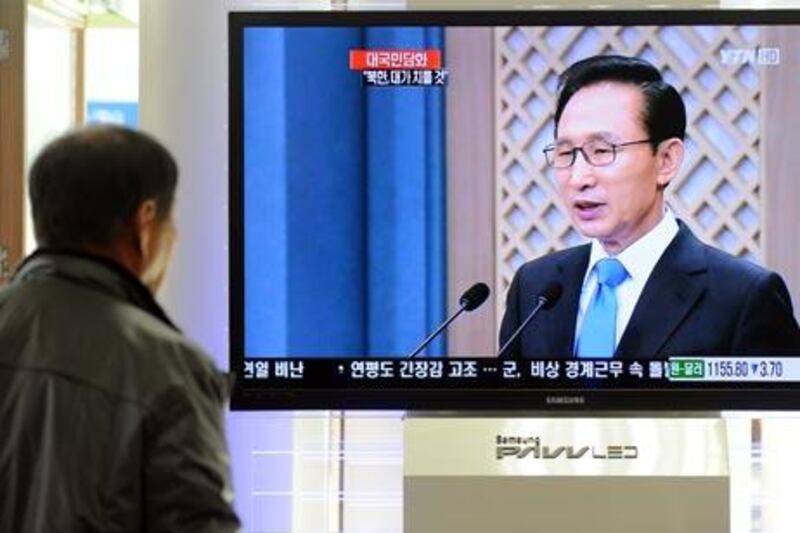A grim-faced South Korean leader vowed Monday to make North Korea pay for any future provocations, following its deadly artillery attack on civilian areas which he called "a crime against humanity".
"If the North commits any additional provocations against the South, we will make sure that it pays a dear price without fail," said President Lee Myung-Bak.
It was his first national address since the North launched a hail of rockets and shells at a South Korean border island six days ago, killing two civilians and two marines, injuring 18 other people and setting homes ablaze.
Mr Lee made no mention of China's call for diplomacy to end the crisis, in what one analyst saw as a tacit dismissal of the initiative.
Instead, he highlighted Pyongyang's past deadly attacks.
The South now realises the North will not on its own abandon its nuclear programme or brinkmanship policy, he said, adding that tolerance would "spawn nothing but more serious provocations".
China, the North's sole major ally, called yesterday for emergency consultations early next month between chief envoys to stalled six-nation talks on Pyongyang's nuclear disarmament.
Mr Lee has come under pressure to take a tougher line after his military's counter-fire against the North's barrage was seen as feeble and led to the resignation of the defence minister.
The US and South Korea began the second day of their biggest-ever naval exercise, a show of strength against the regime that has previously tested nuclear bombs and is blamed for sinking a South Korean warship in March.
The sinking killed 46 sailors and sharply raised tensions, but the artillery attack was the first on civilian areas in the South since the 1950-53 war.
The provocation this time was unprecedented, Mr Lee said.
"A military attack against civilians is strictly prohibited even in time of war; it is a crime against humanity," he added.
Mr Lee said a school was holding classes only a few metres from where shells landed, adding: "I am outraged by the ruthlessness of the North Korean regime, which is even indifferent to the lives of little children."
The South will revise rules of engagement to let the navy and air force strike back immediately after an attack, outgoing defence minister Kim Tae-Young was quoted by Yonhap news agency as telling parliament.
The government has vowed to strengthen defences on Yeonpyeong, the targeted island, and four other frontline islands. Yonhap said five to six more howitzers were deployed today on Yeonpyeong.
The South's military said today's joint naval drills, far south of the tense Yellow Sea border, include a live-fire exercise by multiple aircraft from the US carrier George Washington.
Aegis-class destroyers will hone their capabilities to detect and destroy hundreds of aerial targets, it said.
Eleven ships from the two navies plus aircraft and more than 7,000 personnel are taking part in the four-day drill which began Sunday.
North Korea said the drill is bringing the peninsula to the brink of war.





